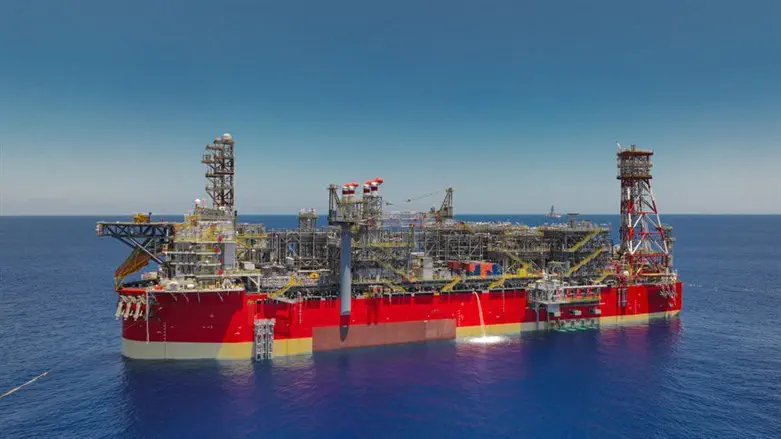
Israel’s Defense Minister, Benny Gantz (National Unity), says that the dispute with Lebanon regarding Israeli gas drilling in the Mediterranean Sea could degenerate into war, depending on Hezbollah's response to the agreement being forged.
In an interview with Israel National News – Arutz Sheva, Dr. Ely Karmon, an expert on the Middle East and Lebanon, discusses the consequences of such an agreement in view of the fact that Iran is hovering just out of sight, overseeing the actions of the various terror groups it supports.
"It is not entirely clear what is happening," begins Karmon, "but it appears that there will be an Israeli concession regarding the size of the area that will be transferred to Lebanese responsibility and also regarding moving the Karish rig closer to the coast. This is a major concession from Israel's point of view."
The question remains: "Will Hezbollah decide that this is sufficient? Will they be able to present this to the Lebanese public as being a balance between their threats and Israel's deterrence? Or is this part of a wider exercise related to Iranian interests in preparation for signing the nuclear agreement with the West?"
"It is possible that the gas agreement is intended to create a clear achievement for Hezbollah and the Iranians that, if successful, will provide a deterrent against Israel in the future, when there will be more significant threats."
"Everything is coordinated with Tehran," states Dr. Karmon. "Over the last two years, Iran has tried to help Lebanon using Hezbollah as mediators. They sent ships with fuel through Syria and said they were ready to help the Lebanese economy that way, but it didn't work out. The Iranians have an interest in appearing to rescue Lebanon."
Karmon sees the gas agreement as something the Iranians can exploit to create instability, thereby putting pressure on the West, which is undecided about the nuclear agreement. They have tried this before. In 2006, when the G-8 countries imposed sanctions on Iran, the Iranians wanted to create a small military operation in southern Lebanon against Israel, but instead of a small operation, it developed into the Second Lebanon War.
Iran miscalculated Israel’s strength. At that time, the Iranians thought that Israel was politically weak. Ehud Olmert had only recently begun serving as prime minister and Defense Minister Amir Peretz, who was photographed "looking through" covered binoculars, was "obviously" someone who did not have a grasp of security; the Iranians mistakenly believed they would have the upper hand in a small operation.
"The same situation can happen here," says Karmon, pointing to evidence of the more complex risks that Iran has begun to take on: "A few weeks ago, the United States managed to foil an assassination attempt on [John] Bolton, [former US President Donald] Trump's security adviser, and [Mike] Pompeo, Trump's foreign minister. Therefore, it is certainly possible that the Iranians will try to create an incident around the gas agreement to advance their larger goals."
"In addition, the question arises as to whether the Iranians are ready to go to war even though it is Hezbollah that wages war on their behalf, both with the approximately one hundred and fifty thousand missiles that cover all of Israel and with the Radwan ground force. Iran knows that Israel could take advantage of a war launched by their proxies by attacking the nuclear infrastructure in Iran. However, Israeli political and military leaders are clear that Israel needs another year or two to be prepared to deal militarily with the Iranian nuclear infrastructure. There is a very delicate game here and it is difficult to know what the Iranians' true intentions are."
Karmon points out that "concessions regarding the Karish platform can be interpreted as Israeli weakness as well as American weakness, as they are pressing for concessions to Lebanon."
The opposition in Israel’s Knesset reminded the Prime Minister that, since 2019, ceding Israeli sovereign territory requires a majority of 80 Knesset members. Karmon explained that "the opposition is trying to embarrass the government and this could be a problem. The government can say that it is ready to accept the terms, but can only sign after the elections." If the government changes, then the agreement may have to be renegotiated. Therefore, while Karish is ready to be activated, "perhaps the whole issue will be postponed until after the elections. Whether or not negotiations can move forward now and leave the final decision to the establishment of a new stable government requires a decision by the ombudsman."
"The story now is one concerning Hezbollah," says Dr. Karmon, who believes that "it was disgraceful when Israel did not eliminate Hezbollah squads that threatened our soldiers when we killed a Hezbollah operative in Syria. We don't shoot at them because we don't want to aggravate the situation, but it gives Hezbollah and Iran a feeling that they can increase their threats against us."